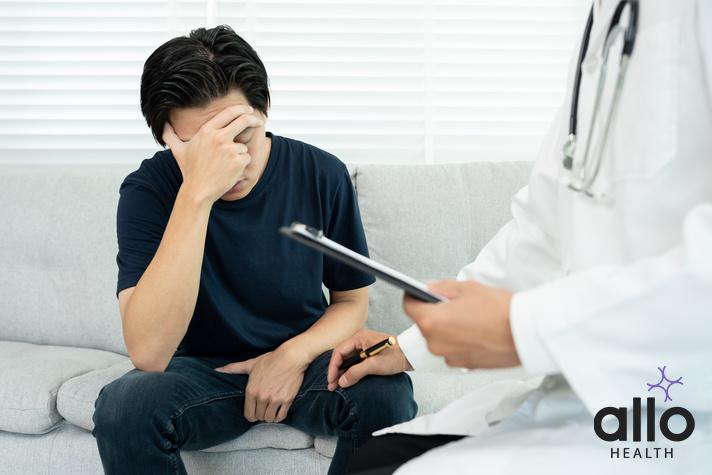How Can a Support Group Help in Coping with Erectile Dysfunction?

Allo Health is dedicated to personalized well-being, offering support and trusted information tailored to individual health goals. The platform emphasizes human-generated content, led by a distinguished medical team of experts, including physicians and sexual health specialists. Their commitment to credibility involves rigorous fact-checking, authoritative research, and continuous updates to ensure accurate, up-to-date information. Allo Health's unique approach goes beyond conventional platforms, providing expert-led insights and a continuous commitment to excellence, with user feedback playing a crucial role in shaping the platform's authoritative voice.

Dr. Raj. R holds an undergraduate medical degree from the Philippines, and has a bachelors background in Psychology. His experience working in the field of urology further brought his interest forward in working towards his passion of understanding the science of attraction, intimacy, sex and relationships. A key motto he practices by remains unprejudiced and non-judgemental care.
Why This Was Upated?
Our experts continually monitor the health and wellness space, and we update our articles when new information became available.
Updated on 25 June, 2024
- Article was updated as part of our commitment to diversity, equity, and inclusion.

"The following blog article provides general information and insights on various topics. However, it is important to note that the information presented is not intended as professional advice in any specific field or area. The content of this blog is for general educational and informational purposes only.
Book consultation
The content should not be interpreted as endorsement, recommendation, or guarantee of any product, service, or information mentioned. Readers are solely responsible for the decisions and actions they take based on the information provided in this blog. It is essential to exercise individual judgment, critical thinking, and personal responsibility when applying or implementing any information or suggestions discussed in the blog."
Erectile dysfunction (ED) is a sensitive topic for most people. Men often feel ashamed to talk about it. It is a condition in which a man has difficulty in achieving or maintaining an erection during sexual intercourse. Even though the causes of ED can vary from physical to psychological, the emotional toll of ED can be very difficult to manage on your own. This is why joining an Erectile Dysfunction support group is considered beneficial.
What is Erectile Dysfunction (ED)?
Erectile Dysfunction is a medical condition that affects millions of men worldwide. It is characterized by the inability to achieve or maintain an erection sufficient for sexual intercourse. While it is a common condition in older men, it can affect men of any age.
The process of achieving an erection involves complex interactions between the brain, hormones, emotions, nerves, muscles, and blood vessels. Any disruption in this process can lead to ED. This condition can manifest in various ways:
- Difficulty in achieving an erection: Men might struggle to get an erection despite sexual arousal or find it takes a more extended period or more stimulation than usual.
- Difficulty maintaining an erection: Men might achieve an erection initially but find it difficult to sustain it throughout sexual activity.
What are the factors leading to Erectile Dysfunction?
There are several factors that can contribute to ED, including physical and psychological causes.
Physical causes may include :
- Diabetes
- High blood pressure
- Heart disease
- Hormonal imbalance
Psychological causes may include :
- Medications
- Stress
- Anxiety
- Depression
- Relationship concerns
One of the most common causes of Erectile Dysfunction is poor blood flow to the penis. This can be due to atherosclerosis, a condition where the arteries become narrowed and hardened, making it difficult for blood to flow through them thereby affecting the body’s ability to fill erectile tissue with blood for erection. Smoking, high cholesterol, and obesity are all risk factors for atherosclerosis.
In some cases, ED can also be a side effect of certain medical treatments, such as radiation therapy for cancer or surgery to remove the prostate gland. Additionally, lifestyle factors such as excessive alcohol consumption, lack of exercise, poor diet, an unhealthy lifestyle drug use can also contribute to ED.
Signs and Symptoms of ED

The most common symptoms of erectile dysfunction include:
- Inability to achieve or maintain an erection during sexual activity
- Reduced sex drive
- Painful erection
- Difficulty achieving orgasm
- Feeling embarrassed when discussing the issue with one’s sexual partner
It is important to note that ED can also be a symptom of an underlying medical condition, such as diabetes, high blood pressure, or heart disease. In some cases, lifestyle factors such as smoking, excessive alcohol consumption, and stress can also contribute to various symptoms of erectile dysfunction. Seeking medical advice and making lifestyle changes can often help improve symptoms and overall sexual health.
Read more about the symptoms of erectile dysfunction.
The Psychological Impact of Erectile Dysfunction
Erectile Dysfunction can have a profound impact on an individual’s mental health and well-being. These might include:
- Feeling of inadequacy
- Shame
- Depression
- Strained relationship with your partner
- Declining overall quality of life
- Low self-esteem
- Low confidence
This can spill over into other areas of life, such as work and social relationships. Men need to recognize that ED is a medical condition and seeking treatment is a proactive step towards improving their overall well-being and quality of life.
ED can also cause anxiety and stress, which can exacerbate the condition. Men may become anxious about their ability to perform sexually, leading to a vicious cycle of anxiety and ED. Hence men need to seek out professional help by being vocal about this condition to address the underlying psychological matters.
Understanding the Importance of Emotional Support in Managing ED
Managing the emotional impacts of ED can be just as important as managing the physical symptoms. Emotional support can come from a variety of sources, but finding a supportive network through a support group can be particularly beneficial.
Support groups provide a safe and non-judgmental space for individuals with ED to share their experiences and feelings with others who understand what they are going through. This can help to reduce feelings of isolation, anxiety, low self-esteem, and loneliness which are common among those with ED.
The Benefits of Joining an Erectile Dysfunction Support Group

Joining a support group can be very beneficial in dealing with Erectile Dysfunction.
- It can offer a safe space to talk to others facing similar challenges, provide emotional support, answer questions regarding ED, and offer practical advice on how to manage your condition.
- Another benefit of joining an ED support group is the opportunity to learn from the experiences of others. Members can share their own stories and strategies for coping with their eating disorder, which can be incredibly helpful for those who are struggling to find effective ways to manage their symptoms.
- Being part of a support group can help individuals feel less isolated and alone in their struggles, which can be a significant source of comfort and motivation.
Different Types of ED Support Groups Available
There are a variety of different ED support groups available, each with its unique focus and structure. Some may be specifically designed for older men, while others may be geared toward men with specific medical conditions. It’s important to find a group that feels right for you.
- One type of ED support group is a peer-led group, where individuals with ED come together to share their experiences and offer support to one another.
These groups may be facilitated by a mental health professional or maybe entirely self-led. Peer-led groups can be a great way to connect with others who are going through similar experiences and to receive emotional support.
- Another type of ED support group is a therapy-based group, which is led by a mental health professional and may incorporate various forms of therapy, such as cognitive-behavioral therapy or group therapy.
These groups may be more structured and focused on addressing specific issues related to ED, such as body image or relationship problems.
Therapy-based groups can be a good option for individuals who are looking for more intensive support and guidance in managing their ED.
How to Find the Right Support Group for You
- Start by asking your doctor or therapist for recommendations, or by doing a simple internet search.
- Once you find a group that interests you, be sure to do your research and make sure it’s a good fit.
- Think about what type of support you’re looking for and what will be most helpful for you in your recovery journey.
What to Expect at Your First ED Support Group Meeting
Attending your first ED support group meeting can be daunting, but it’s important to remember that everyone is there for the same reason.
At your first meeting, you can expect to meet other men facing similar challenges, hear their stories, and share your own if you feel comfortable. The facilitator may lead discussions on topics such as body image, self-esteem, and healthy habits. You may also be introduced to resources such as therapy options and nutritionists who specialize in ED treatment.
Tips for Making the Most Out of Your Support Group Experience
To get the most out of your support group experience, it’s important for individuals with erectile dysfunction to be open and honest about their experiences.
Here are some tips to make the most out of your group session:
- Be willing to listen to others and offer support when you can. Remember that the group is a safe space where you can discuss your feelings and challenges without fear of judgment.
- Attend meetings regularly and participate in group activities. This will help you build connections with other members and feel more comfortable sharing your experiences.
- Don’t be afraid to ask for help or guidance from the group facilitator if you need it.
- Being open to discussion and accepting the fact that this is a health condition just like any other illness is the key.
- Remember that support groups are just one part of your overall mental health care plan. It’s important to continue seeking professional help and practicing self-care outside of the group as well.
The Role of Professional Therapy in Managing ED
Professional therapy for managing ED is invaluable for addressing psychological factors and offering practical coping strategies.
- It offers a secure environment to discuss sensitive topics such as body image and sexuality, allowing for a non-judgmental exploration to foster a healthier relationship with these aspects of life.
- Therapy aids in creating personalized treatment plans, amalgamating evidence-based approaches like talk therapy and cognitive-behavioral therapy for the treatment of ED.
- These plans are tailored to fit individual needs and circumstances, ensuring comprehensive and effective support for ED management.
Other Resources and Further Assistance for Men with ED
There are many resources available for men with ED, including:
- Medical professionals
- Therapists
- Online support communities.
Don’t be afraid to reach out for help if you need it.
One of the most effective treatments for ED is medication. There are several types of erectile dysfunction treatment options and medications available that can help improve blood flow to the penis and increase sexual arousal.
- One such option is penile implants. It is a surgical solution, also known as a penile prosthesis that is placed inside the body to combat erectile dysfunction. However, it is important to consult with a medical professional before taking any medication or treatment for erectile dysfunction, as there are various pros and cons of penile implants, and may not be suitable for everyone.
- Another helpful resource for men with ED is sex therapy. There are many licensed therapists who can help individuals and couples address the psychological and emotional factors that may be contributing to their ED.
A licensed sex therapist can also provide guidance on communication, intimacy, and sexual techniques to improve sexual function and satisfaction.
Joining an ED support group can be your first step towards coping with erectile dysfunction. A support group can offer a safe and supportive space to discuss the challenges of living with ED. By finding the right group and being open and honest about your experiences, you can find healing and support, and manage your condition with confidence and dignity.
Frequently Asked Questions (FAQs)
Q. What is an erectile dysfunction support group, and how can it assist those dealing with ED?
An ED support group is a community where individuals affected by erectile dysfunction come together to share experiences, seek advice, and find emotional support. It provides a safe space to discuss challenges related to ED openly.
Q. What are the different types of ED support groups?
Various ED support groups cater to different needs—some for specific demographics like older men or certain medical conditions. Peer-led groups foster shared experiences and emotional support, while therapy-based groups, led by professionals, offer structured sessions focusing on specific ED-related issues like body image or relationship challenges. Finding the right group is crucial for personalized support in managing ED.
Q. What to expect when participating in an ED support group, and what activities are typically involved?
Expect discussions on coping mechanisms, sharing personal experiences, educational sessions, and a supportive atmosphere. Activities might include group talks, guest speakers, and resources on managing erectile dysfunction.
Q. How can one find or join an erectile dysfunction support group, whether online or in-person?
Finding an ED support group can be done through online searches, healthcare provider referrals, community centers, or non-profit organizations specializing in men’s health. Online platforms often offer forums or websites dedicated to ED support.
Q. What are the specific benefits of online versus in-person ED support groups, and which might be a better fit for individuals seeking help?
Online groups offer accessibility and anonymity, while in-person meetings offer direct emotional connection. The choice depends on personal preferences, convenience, and the level of comfort in sharing experiences in a particular setting.






































